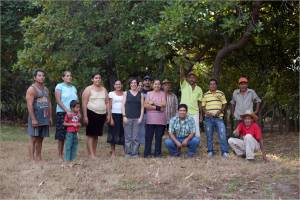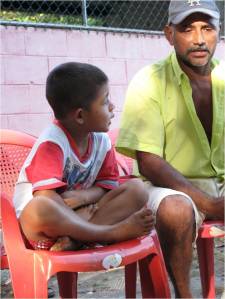It’s Time for Nuts: Part VII
January 15, 2013 by Phyllis Robinson
Read Part I here.

On the island of Montecristo

In the Aprainores office with Don Leopoldo Alfredo Abrego, member of the Oversight Committee. “Back then, it wasn’t easy. Today, well, we’re not swimming in money, but we’re doing okay.”

Alex Flores, General Manager
I’m going to end this series of posts today, simply with a photo collage of some of the Aprainores producers. Click on any photo to enlarge it. Remember, when you buy Equal Exchange cashews, these are some of the folks who you are supporting!


Don Leopoldo and his wife, Maria Eliza

Juan Parada Santana




Maria Los Angeles Mendez

Margarita Gladys Carbajal


Luis Alonso Oriana



Maria Idalia Velasquez


Carmin Soulin




Santos Segundo Fernandez Palacios



Patricia Granado


Oscar Valladares, President


Maria Dolores Martinez (Nina Lola), Secretary

“Sometimes we laugh, sometimes we cry.”



Reyes Cuperada, son of Juan Parada Santana








Alberto and Tono








Photos courtesy of Equal Exchange. Photographer: Julia Hechtman




















































I am looking for a source for cashews that are produced without harmful practices to processing workers. Can you tell me what steps you take to insure that the cashews you sell are raised in a way that is not only economically sound for the farmer but also respectful of the processing workers?
Thanks!
Beth Love
Thank you for your comment. Equal Exchange buys our cashews from small farmer co-operatives in India, El Salvador and Honduras. In El Salvador and Honduras, the workers wear gloves during the first few stages of processing (removing the nut from the shell) to protect them from the natural oils (resin) which are contained in the shell of the cashew nut. In India, the workers prefer to coat their hands with an oil rather than using gloves which they claim get in the way of their dexterity. In El Salvador and Honduras, the processing plant is owned by the farmer co-operative, and the workers come from the area. The rooms are air conditioned and are well lit, with natural sunlight and electric lighting, to keep the air circulating and cool. In the latter processing stages (removing the parchment, sorting and grading), there are strict guidelines about hand-washing and handling the nuts. I hope this has answered your questions – if not please feel free to contact me directly: probinson@equalexchange.coop.